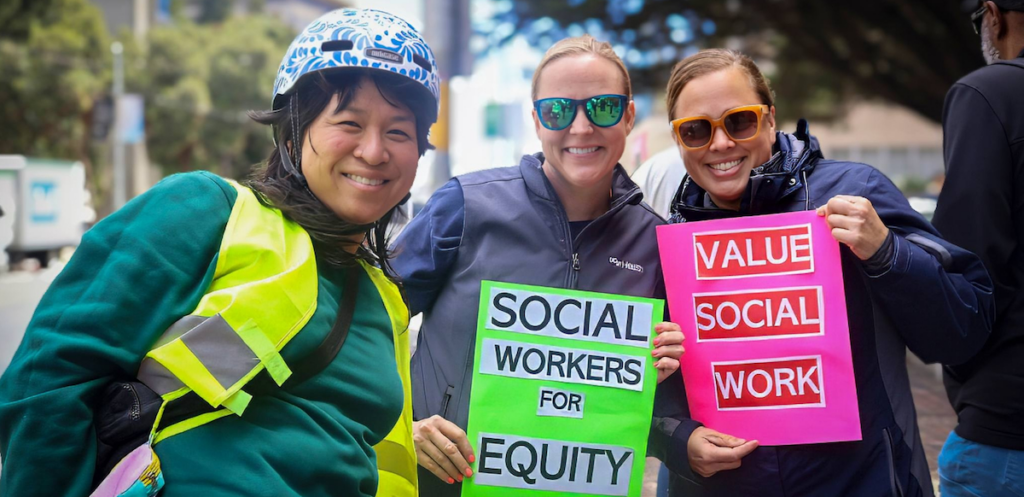Editor’s Note From Rivera Sun
Thanks for your patience last week as I tended to a combination of personal and political crises, and couldn’t put together the regular edition of Nonviolence News. From consoling activists to strategizing with organizers, it was already an intense time when a family situation called me away from my desk. With things in a more stable place, I’m back to collecting and commenting on the latest stories about nonviolence in action. And there’s so much to talk about!
It’s Native American Heritage Month in the United States, and this coming week is the increasingly controversial, though widely celebrated, Thanksgiving holiday. (No Nonviolence News next week, btw. I may not eat turkey, but I will savor some restful time off.) In this week’s Nonviolence News, pay special attention to the stories about Indigenous Peoples successes and struggles. In Alaska, an Indigenous-led loan fund made a #landback purchase possible. In Maine, a conservation group helped finance the Penobscot Nation’s purchase of a 31,000-acre parcel. Wabanaki Nations, including the Penobscot, are getting burial items returned from a Yale University museum in Connecticut. In Oregon, the Indigenous-led efforts to remove dams on the Klamath River have achieved a heartening milestone: one month after the last dam came out, salmon are already spawning in the river.
Meanwhile, in New Zealand, 55,000 people – Maori and allies – held a 9-day march to the capital to oppose revisions that would undermine land rights acknowledged in the 184-year-old treaty. In South Dakota, 1,000 people gathered for an Indigenous Peoples Day march. US President Joe Biden also made a historic first in an official apology to Indigenous Peoples for residential school policies that stole and abused Native children.
In other Nonviolence News, US immigrant groups are mobilizing in the face of threats of mass deportations, a 200,000-person nighttime bicycle ride to a Chinese city famous for dumplings is causing consternation among Chinese authorities, mutual aid groups are rescuing Spain’s flood-battered villages, and 40,000 university workers held a 2-day strike in California. That’s just the tip of the iceberg when it comes to the fascinating stories. Scroll down, click through, and find out what’s happening with nonviolence in our world.
My favorite story? The HateEraser. Thanks to Life After Hate, if you’re caught spray-painting hate speech, you might have to use it to cover over swastikas and slurs as part of your community service hours. It’s poetic justice … and hopefully leads to some inner transformation.
In solidarity,
Rivera Sun
I don’t care much for the upcoming onslaught of BlackFriday, SmallBusinessSaturday, CyberMonday, and GivingTuesday. You won’t be getting funding appeals or buy-this emails from me. You know what I do like? Buy Nothing Day. In honor of this gratitude-based, contentment and creativity oriented effort, I encourage you to send Nonviolence News to 10 friends as a gift. It’s free for everyone. They can sign-up here>>


Across 100 Indian villages, a campaign on natural farming practices is protecting the health of ecosystems, farmers, and community members. This example of constructive program challenges chemical-laden farming and empowers communities to make the food system safer for all species. Read more>>
Kenya’s Water Fund defied the urban-rural divide to support upstream farmers in making shifts in agricultural and land management practices that improved the water quality (and quantities) in downstream Nairobi. You may remember another success story we shared about a similar program around Paris, France. Imagine if this approach was widely adopted in the world. Read more>>
A loan from an Indigenous-led collective, NDN Fund, is helping Qizhjeh Vena, an Alaska Native Women-led non-profit, purchase the Koksetna Wilderness Lodge and surrounding land on Lake Clark. The nonprofit will organize education, community events, and cultural revitalization workshops. Land purchases like this are one strand of the many forms of #LandBack that Indigenous Peoples are pursuing to reclaim lands stolen or taken through colonization. Read more>>
The Penobscot Nation in what is called Maine is regaining 31,000 acres in a massive land return. Facilitated by a conservation group, the land was purchased from a timber company and sold back to the tribe without land-use restrictions. Read more>>
In Montgomery, Alabama, the late Rep. John Lewis is now honored with a statue in the Equal Justice Initiative’s Freedom Plaza. The sculpture is called Steadfast Stride Toward Justice and depicts a young Lewis as he led hundreds of people on the “Bloody Sunday” march to the Edmund Pettus Bridge in Selma. These types of statues and memorials can play an important role in advancing public respect for racial justice and for nonviolent movement leaders. Read more>>
Like many people, we celebrated the removal of the last dam on the Klamath River – an Indigenous-led effort that has spanned decades of hard work and persistent organizing. Here’s even more good news: one month after the last dam came out, salmon are already laying eggs. Read more>>
Yale University’s Peabody Museum has agreed to return 8 stolen items to four Wabanaki nations in what is now called Maine: the Houlton Band of Maliseet Indians, Mi’kmaq Nation, Passamaquoddy Tribe, and the Penobscot Nation. The items were funerary objects placed near burials and were identified for rematriation after the museum conducted a survey under the Native American Graves Protection and Repatriation Act.Read more>>
This is not a joke. The satirical publication The Onion & families of students murdered at Sandy Hook Elementary School have purchased Alex Jones’ Info Wars website at auction. They plan to turn it into a satire of itself to break the cycle of misinformation. Alex Jones has gone through bankruptcy following a court ruling against his slanderous (and repeated) claims that the Sandy Hook shooting was a hoax. In a world that feels short on justice right now, this story is a bright spot. Read more>>

Amidst threats of mass deportations, farmworkers and other immigrant workers are reminding people of the proud tradition of organizing and resistance that already exist in their communities. Three farmworker organizers from Vermont, Florida, and Washington share their thoughts in this interview. Read more>>
It’s called a cazerolazo in Latin American, a casserole in Quebec. In Mozambique, the pots-and-pans banging protest is called a panelaco. City dwellers in affluent high rises and inner-city apartment blocks alike banged on pots to voice their displeasure with the disputed general election results. It’s been a month since the election and protests are still going strong. Shutdowns and transport strikes have also been used. Read more>>
It started as a nighttime bicycle ride to get some snacks (baozi) by four female students in China. It grew into a 200,000-person ride to the city of Kaifeng. Authorities cracked down, citing traffic concerns. But activists note the growing political overtones to the ride and say the crackdown is an attempt to censor dissent. “Some argued that Kaifeng (開封) in Chinese means open or unseal and that riding to Kaifeng symbolizes marching to openness. Some also speculated that the authorities’ suppression was triggered by the sensitive word “baozi”, which is a nickname for Xi Jinping.” Read more>>
US nonprofits and organizers are scrambling in the face of repeated attempts to pass a law that would give the Secretary of the Treasury the ability to strip a nonprofit of its tax exempt status without review or appeal. Though the law claims to be about preventing terrorism, advocacy groups and the ACLU are warning that it will be used to stifle dissent. Read more>>
Across the United States, librarians at universities and colleges are rapidly organizing, anticipating worsening funding cuts under the Trump Administration. (They might want to have a word with educators in Argentina, who are rallying against President Milei’s assault on their national free higher education system.) Read more>>


Photo by Denise Baker
Thousands of people marched in London to unite across issues to demand their government “end its reliance on fossil fuels, commit to paying climate reparations, and end its complicity in the genocide in Gaza.” Cross-issue solidarity like this has a long and powerful history … it deserves a powerful present so we can have a future worth inhabiting. Read more>>
The Anti-COP gathered global climate activists in an alternative to COP26. The Global Meeting for Climate and Life focused on grassroots and frontline organizers who are resisting fossil fuels and ecological destruction around the world. They shared a sense of being excluded and overlooked in the formal COP process, and a growing concern that the solutions that come out of big summits like COP are harming their communities. By the end of the 5-day conference, they published a final statement that outlined next steps for the movement. Read more>>
Last month in Spain, flash floods killed over 200 people and devastated villages. A massive solidarity effort by ordinary citizens rallied to care for impacted communities and clean up after the floods. It mirrored a global trend of mutual aid disaster response organized by people, for people – and it put the weak response by local authorities to shame. Could this kind of disaster response by citizens be mobilized into broader climate action? Read more>>
Gaslighting, a new series of articles from North Carolina reporter Lisa Sorg, explores how environmental activists and ordinary homeowners are racing to thwart an immense fossil fuel buildout of fracked gas pipelines, compressor stations, power plants, and processing facilities that are being planned across the state. Read more>>
A pilot who quit flying to help tackle climate change works to change aviation, for good. (As someone who has also made a commitment to stop flying, this story made me cheer.) The article also points out that 50% of aviation’s carbon emissions come from 1% of the population, especially from the use of private jets. It’s not flying to grandma’s bedside that’s the problem, folks. It’s luxury travel and rich people. Read more>>
The United Kingdom has committed to introducing legislation to ban new coal mines in Britain. The country is striving to reach net zero in carbon emissions and this is seen as a critical step. The announcement itself is a landmark moment, signifying the end of the coal age. Read more>>

40,000 workers at universities in California held a 2-day strike that rallied janitors, custodians, university hospital workers, and other low-paid staff for wage increases, healthcare, and changes to chronic understaffing. (Check out the behind-the-scenes look at how the technical workers prepared for this strike in our Knowledge Section, below.) Read more>>
In the Abkhazia region of Georgia, protesters drove a truck through the gates of parliament and pried metal bars off windows before taking over the building and chanting in the corridors. They’ve been holding down roadblocks and other actions in opposition to a plan to allow Russians to buy property in the region. Locals fear this will price them out of their own homes. The president issued a statement that they are preparing to withdraw the investment agreement. Editor’s Note: I’m not convinced this qualifies as a nonviolent protest, but I think it’s worth keeping an eye on. The protesters seem to have gained concessions from the administration, but will these tactics ultimately backfire? How does this differ from ‘rule of mob’ or from disciplined civil disobedience? How might this approach play out in your own situation? Here in the US, it looks an awful lot like the Jan 6th insurrection, which failed and led to series consequences for many participants. Read more>>
Will postal workers ‘go postal’ over this insultingly paltry contract? The union representing four postal agencies and 200,000 US letter carriers spent 5 years negotiating a 1.3% raise that doesn’t even keep up with current inflation. On top of that, the proposed contract shortens office time – a gripe for overworked, understaffed postal workers who feel harried and hurried in their appointed rounds. Will they strike? I would. Read more>>
Even G20 leaders say it’s time to tax the ultrarich. In a landmark commitment, 19 countries, the European Union, and the African Union agreed to work on measures to make sure the super-wealthy pay their fair share of taxes. “Now is the time to turn words into action and launch an inclusive international negotiation, extending beyond G20 countries, on the reform of the taxation of the superrich,” said economist Gabriel Zucman. Read more>>
Bookstore workers at Barnes & Noble held a rally for a fair contract that includes protections from store closures, healthcare, and union benefits. They were joined by other unionized bookstore workers, shoppers, and labor groups. Read more>>

55,000 people joined a 9-day march to New Zealand’s capitol led by Indigenous Maori. They entered the parliament building in protest of revisions to the 184-year-old Treaty of Waitangi that grants Maori tribes land rights. As the vote took place, 22-year-old legislator Hana-Rawhiti Maipi-Clarke, tore up a copy of the bill and led colleagues in a traditional haka dance. People in the gallery joined in, drowning out debate in the chamber and briefly suspending parliament. Though the measure passed the ‘first reading’ process, it seems unlikely to become law as many parliament members are expected to vote against it in the final vote. Read more>>
A violent clash in Amsterdam between Israeli and Dutch fans was triggered by Israeli’s hurling anti-Palestinian slurs and smashing the windows of citizens displaying Palestinian flags. The mayor banned protests in the wake, leading activists to denounce the suppression of nonviolent protest. Other activists are working hard to advance healing for Jews, Muslims, and other citizens. “What makes me angry is that they come, act in the most violent and racist ways, and then leave us to clean up their mess,” one activist said of the Israeli football club fans involved in last week’s violence. “This episode only makes Jews and Muslims suffer the most. If we are more divided and can’t work together, there’s little we can do as communities to improve the current situation.” Read more>>
A group called Cultural Survive has shared 8 Ways to Decolonize “Thanksgiving”. “Stories told about the first Thanksgiving often perpetuate harmful stereotypes and racism. It is important to set the record straight, acknowledge Native Peoples, debunk myths, and show Native Americans as contemporary people with dynamic thriving cultures. November is National Native American Heritage Month and offers many opportunities to move past one-dimensional representations. Thanksgiving is an opportunity to also go beyond the harmful “pilgrims and Indians” narrative and focus on common values: generosity, gratitude, and community.” See more >>
President Biden made a historic apology to Indigenous Peoples on Oct 25, 2024, for the harms and deaths caused by the federal Indian boarding school system operated by the U.S. for nearly 200 years. This move comes after First Nations in Canada campaigns for truth and reconciliation, and federal accountability, for the Canadian residential schools that stole Indigenous children from their families. NDN Collective provided a statement directly addressing Biden’s apology and the need for more action behind his words. Read more>>
Over 1,000 people gathered for a power-building event on Indigenous Peoples’ Day in MniLuzahan (Rapid City, South Dakota. This was the second annual march, rally, and community event hosted by NDN Collective to mark Indigenous People’s Day. Read more>>
A first-generation immigrant protected by DACA – a hard won law passed because of immigrant youths’ bold organizing – speaks about turning election fear into immigrant power. “I am a DACA recipient, one of 650,000 people who may be targeted when the Trump administration comes into place,” writes Itzel Hernandez. “I am also someone who works with young people and immigrant communities in New Jersey every day. I want to give you an idea of how we are organizing and advocating for more welcoming, dignified, and just immigration policies. And I want to show you how much is possible when communities come together.” Read more>>

Voices of Resilience: Women Defending Human Rights in Southeast Asia Webinar contributed to a truly global conversation with participants from universities in all corners of the world, including Canada, Bosnia and Herzegovina, the Philippines, Myanmar, Nigeria, Pakistan, among many others. Watch here>>
Formerly and currently incarcerated women successfully halted abusive conditions inside prisons. Now, they’re fighting to end women’s incarceration in California completely. Read more>>
Thanks to grassroots efforts and international groups, Thailand recently passed a landmark law approving same-sex marriage. LGBTQIA+ advocacy groups say it can open the door for further gains throughout the region. Read more>>
A new book, We Grow The World Together: Parenting Toward Abolition, shares essays on how mothers (and others) are making prison abolition possible. How mothers (and others) are making prison abolition possible: A new collection of essays explores the role of cultivating radical resistance through care in growing the world we want. Read more>>

100 protesters occupied and shut down the Senate Atrium of the US Congress as senators voted on a weapons shipment to Israel bill. 49 people were arrested and the bill was passed with bipartisan support, but organizers are clear that resistance to genocide will continue. Read more>>
Ahead of the G20 Summit in Rio de Janeiro, hundreds of protesters marched in solidarity with Palestinians. Also addressing global issues, the action aimed to send a message to heads of state as they convened for the conference. Read more>>
In Canada, hundreds of people protested at 16 factories and facilities that produce and maintain the F-15 fighter jets that are bombarding Gaza and Lebanon. Activist are demanding that Canada impose an immediate, two-way arms embargo on Israel. The fighter jets are being used to drop 2000 lb bombs on residential neighborhoods, schools, and refugee camps amidst the most destructive attacks in recent history. Read more>>
More Israelis are becoming draft resisters and refusing deployment to Gaza. Will it help end the genocide? Read more>>

Life After Hate makes people who graffiti hate speech use the HateEraser as part of community service. Life After Hate is spotlighting the dangers of ideology-based graffiti, while distributing a new product — HateEraser — that first-time hate offenders are required to use during their court-mandated community service. Read more>>
It’s a rough time in the world. A music program in Seoul City is offering healing concerts for free in public parks. It’s an example of how communities can foster self-care and community care in ways that help citizen take a deep breath and find their grounding. If it helps to reduce violence and self-harm, it can be seen as a form of nonviolence in action. Read more>>
Using hymnals, poetry, and imagery along with potent writings, Tricia Hersey, the author of Rest As Resistance and the founder of the Nap Ministry, has released a new book: We Will Rest! The Art of Escape. As a Black woman, Hersey has been showing people how capitalism and “grind culture” are forms of violence that are leading to health issues and early deaths, disproportionately affecting people of color. Rest is resistance. Read more>>

Here’s an inside look at how a 19,000-person technical workers union representing psychologists, therapists, hospital workers, research support, and technical employees at university-run hospitals prepared for their November strike. (Find a report on the 2-day strike, which swelled to 40,000 participants, in the Economics Section above.) Read more>>
Mutual aid groups have launched catastrophe relief efforts throughout the hurricane and flood hit regions in North Carolina. Like the counterparts in Spain, grassroots groups, local businesses, and community members are providing critical supplies like food, generators, and baby formula to survivors. Read more>>
Civil resistance researcher Maria J. Stephan (co-author of the landmark Why Civil Resistance Works) explains how US citizens have risen to impossible challenges in the past … and how we can confront the new wave of authoritarianism. Read more>>
Nonviolence Radio explores the 7 challenges of nonviolence: liberating the oppressor (not just the oppressed), finding inner harmony, telling a new story, deepening compassion, building alternatives, finding unity in diversity instead of sameness, and shifting out of chaos into constructive creativity for change. Read more or listen here>>
Moving beyond big marches, the activists (primarily women of color) who organized the massive 2017 Women’s March is shifting its strategy. While they are still planning a People’s March for Jan 20th, 2025, they’re also thinking about how moments of mass mobilization can lead to deeper training and other types of action. Read more>>

Bluesky Ramp-Up Session For People Power: As an exodus from Twitter/X occurs, Social Movement Technologies is doing a teach-in on BlueSky. (Dec 2) Learn more>>
Help World BEYOND War Put Up Peace Billboards: Countering war narratives and mass media is no easy job. Help this peace group put up peace billboards at bus stops and on public transit. Learn more>>
Support Puerto Ricans In Opposing Fracked Gas Infrastructure: Puerto Ricans are resisting a plan for a fracked gas terminal in their harbor. The project violates federal law and has not been approved by the regulatory commission. Send a message telling authorities to listen to concerns and protests from the local community. Learn more>>
Let it Move You: A Care Package For Grieving Times: Join Buddhist Peace Fellowship for a series of virtual gatherings to help us process our deep grief. Let It Move You: a care package for grieving times takes the perspective that grief is not a thing to be regulated away. It’s an invitation to expression, reconnection, and resting in deep care. It’s a call to cultivate patience, to discover our resolve, and recognize the true depth of our love and our power. (Dec 7-Jan 18) Learn more>>
How Do I Take Action Where I Am – Webinar Series: If you’re new to activism and organizing, this series might be just the thing to learn strategies for nonviolent action, resistance, and self-care amidst the struggle. (Dec-Jan) Learn more>>
Integrity: A Retreat on Principled Nonviolence: Principled nonviolence is the heart of change. In this special retreat, join others to reflect, study, and apply the depth of principles that have guided nonviolent change agents throughout history. We will explore the examples of M.K. Gandhi, Dr. Martin Luther King, Jr., Thich Nhat Hanh, Cesar Chavez, Jesus, Buddha, and many more. (Dec 8) Learn more>>
Artists On Nonviolence: A Talk with Pace e Bene’s Art Makers: Join this inspiring event featuring three talented artists who have collaborated with Pace e Bene on numerous nonviolence-themed projects over the past five years. Rosie Davila, Bianca Pointner, and Leah Cook will share their art and process that they have used to make stunning graphics, illustrations, poster designs, coloring pages, and animations. The session will feature artist spotlights, thought-provoking discussions, and hands-on creative exercises designed to explore how art can impact our lives as a force for nonviolent change. (Dec 14) Learn more>>
Nonviolence Daily: A 4-Week Challenge & Book Discussion Group on Gandhian Nonviolence: Using Nonviolence Daily: 365 Days of Inspiration From Gandhi, we will spend a month reading short quotes from Mohandas K. Gandhi, along with the thought-provoking commentaries from authors Stephanie Van Hook and Michael Nagler of the Metta Center For Nonviolence. During our 4 weekly virtual sessions, we will discuss that week’s quotes, reflect on their deep meanings, and explore how these ideas about nonviolence fit into our modern lives. (Starts Jan 9, 2025) Learn more>>








